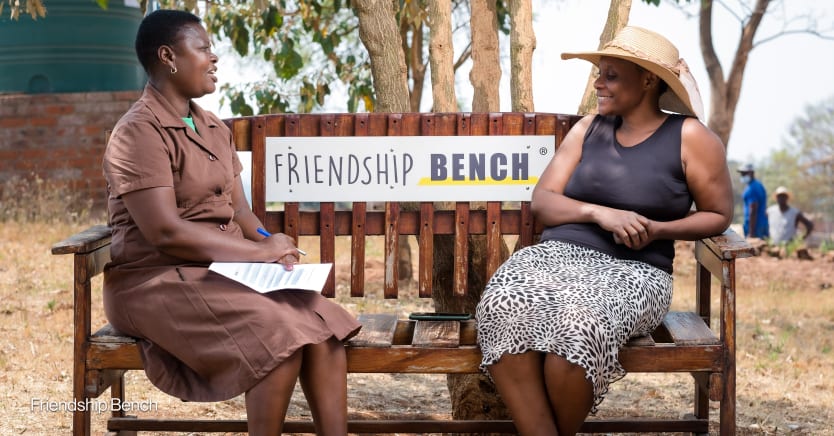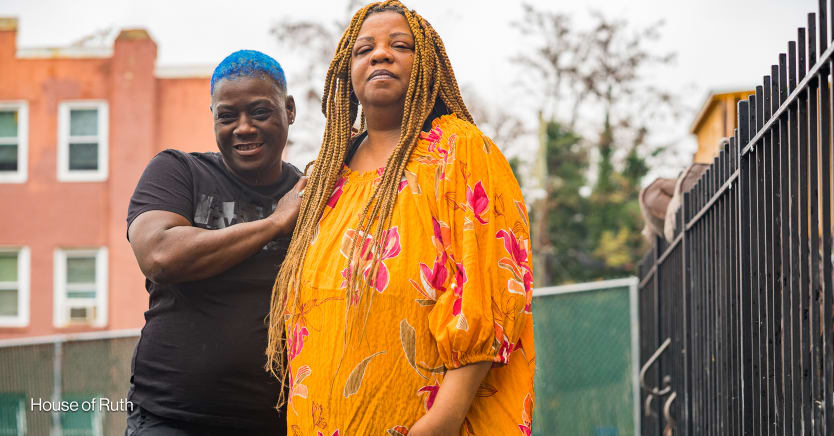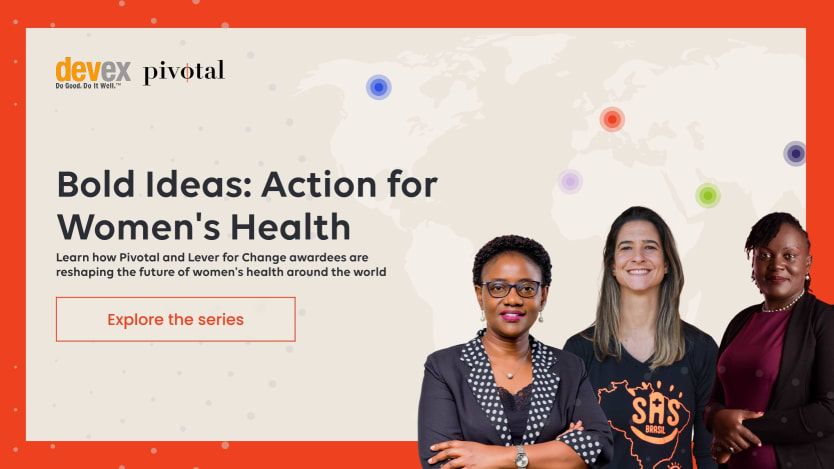 Action for Women’s Health grantee Friendship Bench builds the capacity of grandmothers to deliver therapy to clients in communities across Zimbabwe. Photo by: Friendship Bench
Action for Women’s Health grantee Friendship Bench builds the capacity of grandmothers to deliver therapy to clients in communities across Zimbabwe. Photo by: Friendship Bench
Across six continents, over 80 organizations are reimagining what it means to care for women’s physical and mental health. They are the newly announced awardees of Action for Women’s Health — a $250 million global open call funded by Pivotal, a group of impact organizations founded by Melinda French Gates, in partnership with Lever for Change.
But this isn’t just about putting capital on the table. The initiative is a bold step in closing persistent gender gaps in women’s health research and access to care, in a world where only around 1% of funding for health care research and innovation is invested in female-specific health issues, outside of oncology. As a result, women spend an average of nine years in poor health — 25% more than men. Needless to say, the stakes are high.
Grantees include both long-standing NGOs and emerging community groups, large health networks, and small grassroots initiatives. Together, they represent a variety of women’s experiences — from Indigenous midwives in Mexico to legal advocates in Uganda. Going beyond treating illness, their work tackles the real-world barriers that keep women from being mentally and physically healthy: poverty, stigma, gender-based violence, and a lack of representation in decision-making.
Rather than top-down interventions, they are community-led innovations rooted in lived experience. By elevating local leadership, the awardees are proving what’s possible when funding follows those who understand the challenges and the solutions from the inside out.
Here, Devex explores some of the key themes coming out of the awards and speaks with some of the grantees to discuss opportunities for challenging the status quo.
Confronting the global gap in women’s health
Women across the world face a disproportionate burden of health challenges. A global analysis found that women lose far more healthy years to depression than men — 564 disability-adjusted life-years, or DALYs, per 100,000 women, compared with 354 DALYs per 100,000 men. More than 1.2 billion women and girls suffer from malnutrition, with lifelong consequences for physical and cognitive development. And in many places, women continue to confront overlapping risks — from complications in pregnancy and childbirth to rising rates of noncommunicable diseases — that compound throughout their lives.
Yet even as women experience these outsized health challenges, their needs have long been overlooked in research, policy, and investment. For decades, women were routinely excluded from clinical trials, leaving gaps in understanding how diseases, treatments, and medications uniquely affect them. Today, this legacy persists with less than 1% of studies on aging biology, including menopause, and only around 1% of health care research and innovation funding directed toward female-specific conditions outside of oncology.
These statistics come amid a global contraction in aid and funding for women’s health, threatening to roll back hard-won gains in maternal health, reproductive rights, and access to essential services. Cuts to sexual and reproductive health programs, mental health services, and maternal care have left many local organizations struggling to sustain essential programs — even as evidence shows that investing in women’s health also strengthens families, communities, and economies, creating ripple effects that benefit society as a whole.
“Women’s health has been significantly affected by changes in development aid, with gains over years threatened, particularly in areas such as sexual and reproductive health and rights,” said Fatia Kiyange, executive director of Uganda’s Center for Health, Human Rights and Development, or CEHURD, one of the awardee organizations. “Funding to women’s organizations needs to integrate institutional sustainability, beyond project durations and long-term strategies for addressing threats.”
Expanding access in overlooked geographies
Action for Women’s Health awardees are reaching women throughout the world, including in low-income countries where traditional health systems have struggled to meet women’s basic needs.
In Mexico, Mujeres Aliadas blends traditional and professional midwifery in an intercultural, feminist model. “By training midwives who return to their communities, we ensure care is accessible, culturally relevant, and empowering, creating a model that truly meets the needs of women and adolescents across Michoacán,” Executive Director Lisel Lifshitz explained. “Hope grows in girls and adolescents who learn to know and love their bodies, and in women reclaiming their right to health throughout their lives and to a joyful, shame-free sexuality.”
Similarly, across the Pacific, Likhaan Center for Women’s Health in the Philippines currently runs nine community-based reproductive health programs in Metro Manila, Luzon, and the Visayas. “Likhaan community organizers are organic to the disadvantaged communities we work in because they live there,” explained Junice Lirza Melgar, executive director at the center. “They understand the needs and aspirations of the women and youth, and embed these in our mission and programs. Communities trust and support Likhaan and the services and advocacies we bring because of this vital linkage.”
Meanwhile, SAS Brasil deploys telemedicine and mobile units to bring cancer screening and women’s health services to the Amazon and beyond. “We don’t wait for patients to come to care, we bring specialized care to them,” said Adriana Mallet, SAS Brasil’s cofounder and chief medical officer. “Investing in digital health for women is not charity, it is systems transformation.”
Tackling intersecting challenges
Truly improving women’s health means recognizing and addressing the intersecting social, economic, and medical factors that shape women’s lives.
 House of Ruth will use its grant to scale its no-cost counseling services to address the gap in accessible mental health care for domestic violence survivors in Washington, D.C. Photo by: House of Ruth
House of Ruth will use its grant to scale its no-cost counseling services to address the gap in accessible mental health care for domestic violence survivors in Washington, D.C. Photo by: House of Ruth
In Washington, D.C., House of Ruth has spent five decades supporting women and families rebuilding their lives after trauma. Its holistic model connects the dots between domestic violence, homelessness, and mental health. “Investing in the women’s health space requires an expansive outlook on the social determinants of health as well as health care itself,” said Sandra Jackson, president and CEO. “Addressing each basic need is a building block for a woman to unlock her capacity to address the next.”
Across the Pacific, ChildFund Australia focuses on holistic approaches that ensure services are culturally appropriate and responsive to women’s physical, mental, and social well-being. They do this by working in partnership with community leaders, local organizations, and health service providers, while supporting partner governments to strengthen health care systems for long-term impact, explained Sophie Jenkins, international programs director.
Innovation through community-driven care
Together, the Action for Women’s Health awardees are redefining what innovation in women’s health looks like — showing that progress doesn’t always come from technology, but often from community wisdom and locally driven solutions that bridge the gap between systems and the people they serve.
In Zimbabwe, Friendship Bench has become a model for grassroots mental health innovation, with grandmothers trained as lay therapists providing evidence-based talk therapy in their own communities. “As respected custodians of local culture, these grandmothers bridge traditional wisdom with evidence-based mental health care, offering trusted, stigma-free support,” CEO Dr. Esther Tumbare explained. “Their deep community roots make therapy accessible and relatable, ensuring lasting impact … for women who might otherwise never seek formal mental health services.”
Based in North America, Open Arms Perinatal Services also takes a community-led approach. “Our doulas, lactation specialists, perinatal educators, and family support team come from the same communities we serve, allowing families to be seen and supported without judgment,” said Dila Perera, executive director. “By pairing cultural connection with skill, we deliver outcomes that are both measurable and lasting.”
And in the United Kingdom and Africa, the Foundation for Women’s Health Research and Development, or FORWARD UK, continues its decades-long fight against gender-based violence and female genital mutilation. By establishing an in-depth relationship with the communities they work in, they are seeing survivors become empowered changemakers, said Naana Otoo-Oyortey, executive director. “More women are speaking out … building solidarity and sisterhood.”
Looking ahead: a new model for philanthropy
The Action for Women’s Health announcement underscores a growing shift in global health philanthropy – replacing one-size-fits-all interventions with locally rooted, participatory approaches that acknowledge the complex social and medical factors shaping women’s health.
For Pivotal and Lever for Change, this open call represents a commitment to dramatically accelerating progress in women’s health through community-driven solutions.
“We’re excited to shine a light on so many talented people who are doing incredible work to help women around the world live healthier lives,” said Haven Ley, Pivotal chief strategy officer. “And these are only a few of the many organizations worldwide that deserve greater support. We hope others will join us in ensuring that progress in women’s health becomes a global priority.”
Explore the full list of Action for Women’s Health grantees here.
This content is sponsored as part of Bold Ideas — a series celebrating health breakthroughs and spotlighting the bold, grassroots solutions putting the power back in women’s hands. Click here to learn more.
Printing articles to share with others is a breach of our terms and conditions and copyright policy. Please use the sharing options on the left side of the article. Devex Pro members may share up to 10 articles per month using the Pro share tool ( ).

